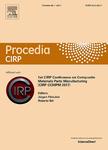版权所有:内蒙古大学图书馆 技术提供:维普资讯• 智图
内蒙古自治区呼和浩特市赛罕区大学西街235号 邮编: 010021

作者机构:University of Stuttgart Institut fuer Strahlwerkzeuge (IFSW) Pfaffenwaldring 43 70569 Stuttgart Germany University of Stuttgart Institute for Control Engineering of Machine Tools and Manufacturing Units (ISW) Seidenstr. 36 70174 Stuttgart Germany University of Stuttgart Institute for Machine Tools (IfW) Holzgartenstr. 17 70174 Stuttgart Germany Karlsruhe Institute of Technology (KIT) wbk Institute of Production Science 76131 Karlsruhe Germany
出 版 物:《Procedia CIRP》
年 卷 期:2022年第111卷
页 面:816-821页
学科分类:12[管理学] 1201[管理学-管理科学与工程(可授管理学、工学学位)] 08[工学]
主 题:laser-based manufacturing Industry 4.0 versatile machine tool adaptable manufacturing multi-process
摘 要:The current trend in the context of Industry 4.0 towards small batch sizes and increasing product variety results in ever-changing requirements for both, the products and the production. This requires highly versatile, fully and easily adaptable, and efficient manufacturing environments that can meet these demands, ideally already on the level of the machine tool. Because of its versatility, the laser is a promising tool for such a machine tool, but there is still a considerable need for research in the field of system technology. We consider the requirements for a versatile, laser-based machine tool for highly adaptable manufacturing, that utilizes the combination of laser-based manufacturing processes on one machine. The focus of the considerations lies on remote processes and the processing of metals. Five key research topics for the development of such a universal laser manufacturing node are identified: highly dynamic and precise kinematics (1); ‘on-the-fly’ reconfigurable, distributed control architectures (2); adaptable process diagnostics for online quality monitoring (3); technological interactions in laser-based process chains (4); and models for a fast estimation of the process parameters for each production step (5). The relevance and current needs for research for each topic are discussed and corresponding solution concepts are proposed.